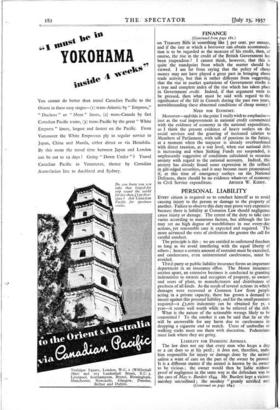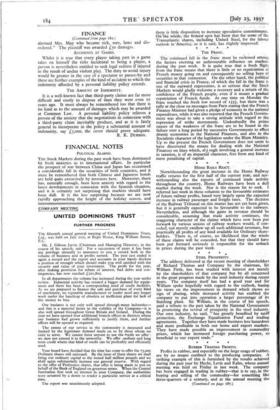PERSONAL LIABILITY
EVERY citizen is required so- to conduct himself as to: avoid causing injury to the person or damage to the property of another. Failure to observe this duty may prove very expensive because there is liability at Common Law should negligence cause injury of damage. The extent Of the duty to take care varies according to numerous factors, but although the law may set no , high degree of watchfulness_ in our every-day actions, yet reasonable care is expected and required. The more advanced the state of civilisation the greater the call for careful conduct.
The principle is this : we are entitled to unfettered freedom so long as we avoid interfering with the equal liberty of others ; hence a certain amount of restraint must be exercised, and carelessness, even unintentional carelessness, must be avoided.
Third-party or public liability insurance forms an important department in an insurance office. The Motor insurance section apart, an extensive business is conducted in granting indemnities to owners and occupiers of property, to owners and users of plant, to manufacturers and distributors of products of all kinds. As the result of several actions in which damages were recovered at Common Lavi, from jaeOple acting in a private capacity, there has grown a demand to insure against this personal liability, and for the small premium required—a £5,000 indemnity can be obtained for 5s. a year—it seems well worth while to be relieved of the risk.
What is the nature of the actionable wrongs likely to be committed ? To the smoker it .can be -said that he or she will be answerable for any harm due to carelesiness in dropping a cigarette end or match. Users of umbrellas or walking sticks must use them with discretion. Pedestrians must look where they are going.
LIABILITY FOR DOMESTIC ANIMALS.
The law does not say that every man who keeps a dog or a cat does so at his peril ; it does not, therefore, make him responSible Or injury or damage done by the animal unless, a want of care on the part of, the owner be. proved. It is a different matter if the animal is known by its owner to be vicious ; the owner would then be liable without proof of negligence in the same. way as the defendant was in the case of May v. Burdett 1844. Mr. Burdett kept a vicious monkey unconfined ; the monkeY " greatly terrified and
(Continued. on page 18+) - • . FINANCE
(Continued from page 182.)
alarmed Mrs. May who became sick, sore, lame and dis- ordered." The plaintiff was awarded £50 damages.
ACCIDENTS AT GAMES.
Whilst it is true that every player taking part in a game takes on himself the risks incidental to being a player, a person is nevertheless entitled to seek legal redress if injured as the result of undue violent play. The duty to-avoid injury would be greater in the case of a spectator or passer-by and these are further examples of the kind of accident to which the indemnity afforded *by a personal" liability pifficY extends.
THE AMOUNT OF INDEMNITY.
It is a well-known fact that third-party claims are far more difficult and costly to dispose of than they were even io years ago. It must always be remembered too that there is no limit as to the amount of damages which may be awarded at Common Law. A personal liability • policy relieves a person-of the anxiety that the negotiations in connexion with a third-party claim inevitably produce, and as it is fairly general to incorporate in the policy a substantial amount of indemnity, say • L,000, the cover -shOiild prove adequate.
R. K. DURBON.































































 Previous page
Previous page